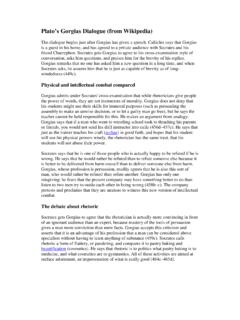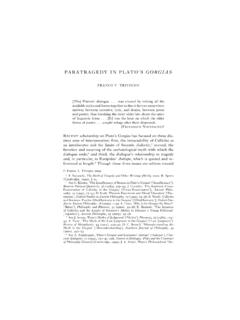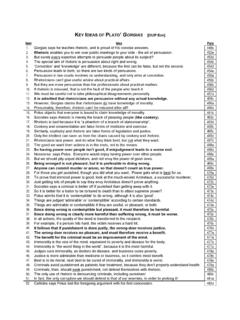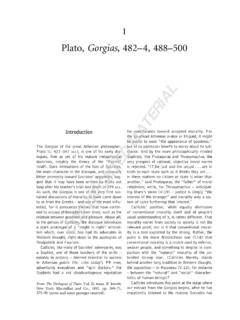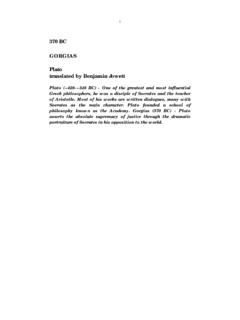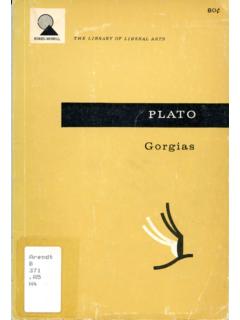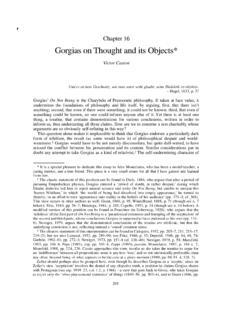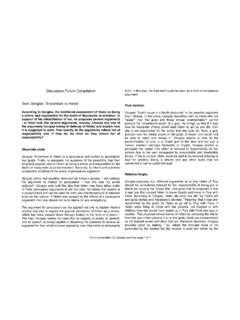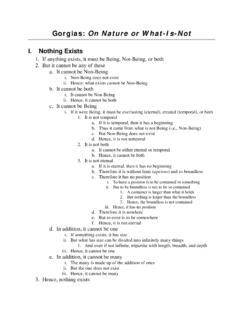Transcription of Gorgias, by Plato - PDFBooksWorld
1 0 1 gorgias By Plato Translated by Benjamin Jowett This eBook is designed, edited and published by PDFB ooksWorld and can be accessed & downloaded for personal reading by registered members of PDFB ooksWorld at Though the text, illustrations and images used in this book are out of copyright, this unique PDF formatted edition is copyrighted. Readers of this book can share and link to pages of our website through blogs and social networks, however the PDF files downloaded from our website shall not be stored or transmitted in any form for commercial purpose.
2 Disclaimer: This edition is an electronic version of a public domain book, which was originally written many decades ago. Hence contents found in this eBook may not be relevant to the contemporary scenarios. This book shall be read for informative and educational purpose only. This eBook is provided AS-IS with no other warranties of any kind, express or implied, including but not limited to warranties of merchantability or fitness for any purpose. 2 Contents gorgias .. 1 Contents .. 2 INTRODUCTION.
3 3 gorgias .. 74 By Plato .. 74 3 INTRODUCTION. In several of the dialogues of Plato , doubts have arisen among his interpreters as to which of the various subjects discussed in them is the main thesis. The speakers have the freedom of conversation; no severe rules of art restrict them, and sometimes we are inclined to think, with one of the dramatis personae in the Theaetetus, that the digressions have the greater interest. Yet in the most irregular of the dialogues there is also a certain natural growth or unity; the beginning is not forgotten at the end, and numerous allusions and references are interspersed, which form the loose connecting links of the whole.
4 We must not neglect this unity, but neither must we attempt to confine the Platonic dialogue on the Procrustean bed of a single idea. (Compare Introduction to the Phaedrus.) Two tendencies seem to have beset the interpreters of Plato in this matter. First, they have endeavoured to hang the dialogues upon one another by the slightest threads; and have thus been led to opposite and contradictory assertions respecting their order and sequence. The mantle of Schleiermacher has descended upon his successors, who have applied his method with the most various results.
5 The value and use of the method has been hardly, if at all, examined either by him or them. Secondly, they have extended almost indefinitely the scope of each separate dialogue; in this way they think that they have escaped all difficulties, not seeing that what they have gained in generality they have lost in truth and distinctness. Metaphysical conceptions easily pass into one another; and the simpler notions of antiquity, which we can only realize by an effort, imperceptibly blend with the more familiar theories of modern philosophers.
6 An eye for proportion is 4 needed (his own art of measuring) in the study of Plato , as well as of other great artists. We may hardly admit that the moral antithesis of good and pleasure, or the intellectual antithesis of knowledge and opinion, being and appearance, are never far off in a Platonic discussion. But because they are in the background, we should not bring them into the foreground, or expect to discern them equally in all the dialogues. There may be some advantage in drawing out a little the main outlines of the building; but the use of this is limited, and may be easily exaggerated.
7 We may give Plato too much system, and alter the natural form and connection of his thoughts. Under the idea that his dialogues are finished works of art, we may find a reason for everything, and lose the highest characteristic of art, which is simplicity. Most great works receive a new light from a new and original mind. But whether these new lights are true or only suggestive, will depend on their agreement with the spirit of Plato , and the amount of direct evidence which can be urged in support of them.
8 When a theory is running away with us, criticism does a friendly office in counselling moderation, and recalling us to the indications of the text. Like the Phaedrus, the gorgias has puzzled students of Plato by the appearance of two or more subjects. Under the cover of rhetoric higher themes are introduced; the argument expands into a general view of the good and evil of man. After making an ineffectual attempt to obtain a sound definition of his art from gorgias , Socrates assumes the existence of a universal art of flattery or simulation having several branches: this is the genus of which rhetoric is only one, and not the highest species.
9 To flattery is opposed the true and noble art of life which he who possesses seeks always to impart to others, and which at last 5 triumphs, if not here, at any rate in another world. These two aspects of life and knowledge appear to be the two leading ideas of the dialogue. The true and the false in individuals and states, in the treatment of the soul as well as of the body, are conceived under the forms of true and false art. In the development of this opposition there arise various other questions, such as the two famous paradoxes of Socrates (paradoxes as they are to the world in general, ideals as they may be more worthily called): (1) that to do is worse than to suffer evil; and (2) that when a man has done evil he had better be punished than unpunished; to which may be added (3) a third Socratic paradox or ideal, that bad men do what they think best, but not what they desire, for the desire of all is towards the good.
10 That pleasure is to be distinguished from good is proved by the simultaneousness of pleasure and pain, and by the possibility of the bad having in certain cases pleasures as great as those of the good, or even greater. Not merely rhetoricians, but poets, musicians, and other artists, the whole tribe of statesmen, past as well as present, are included in the class of flatterers. The true and false finally appear before the judgment-seat of the gods below. The dialogue naturally falls into three divisions, to which the three characters of gorgias , Polus, and Callicles respectively correspond; and the form and manner change with the stages of the argument.
